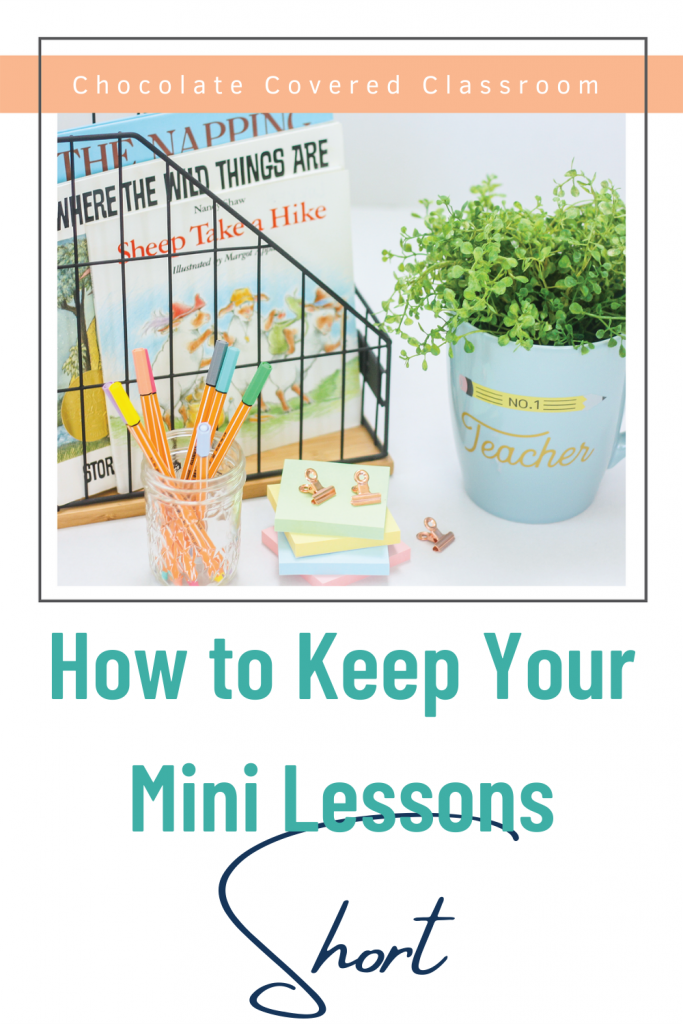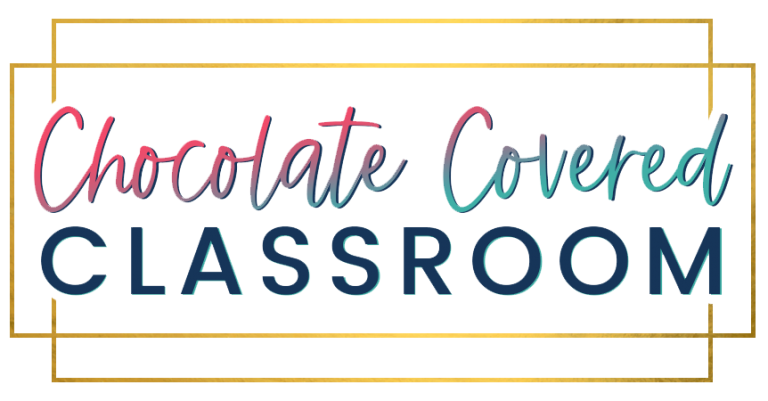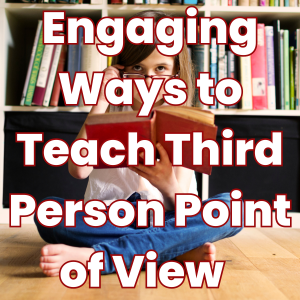In order to fit everything into our busy Reading and Writing Workshop schedules, we need to keep our mini lessons MINI! This means that they need to be anywhere from 10 – 15 minutes long.
Not only does keeping them short allow for our students to have more time to read and write independently, but it also provides us with more time to differentiate our instruction in small groups. Furthermore, by keeping our mini lessons mini, we’re ensuring that we’re fitting all of our awesome teaching within the attention spans of our students.
However, keeping our mini lessons short is easier said than done. I mean, the first time that I read through the Lucy Calkins Reading Workshop teacher’s manual, I think it took me more than 10 minutes to just read the lesson! That’s why today I am providing you with 5 strategies that help me to keep my mini lessons short.
1) Keep Your Connection Simple
All reading and writing workshop mini lessons follow a predictable format. Not only does this make it easier for the kiddos to follow along, but it also makes it easier for you to speed things along!
The first part of the mini lesson is always the connection. If you read the Lucy Calkins books, their connections are almost always super lengthy. They provide these amazing metaphors and stories. The problem is that a connection is only supposed to take 2 minutes MAX.
So here’s what I suggest. If you like the connection that they give you, then use it! I probably use about half of the ones that they provide because I really like them.
But if it doesn’t resonate with you or it just seems really long, here is a super simple connection that will work for literally any lesson.
“Yesterday we…” (Fill in the blanks with what you learned yesterday.)
That’s it LOL! Yes, I told you it was simple.
2) Know the teaching point like the back of your hand
The next component of the mini lesson is the teaching point. This is where you explicitly state what you will be teaching students that day.
It sounds like this: “Today I am going to teach you…”
Explicitly telling our students what they can expect to learn in the lesson is so important. If you are new to Reading or Writing workshop, you might even consider writing the teaching point on a post it note so that you have the exact terminology.
Sometimes the teaching point can be a few sentences long. It’s a huge time waster to try and remember all of the precise words while you’re in front of the kids. That’s why I suggest either writing it down or reading it over several times before the lesson.
3) Remember that you’re not teaching for mastery!
The next two components of the mini lesson are the teaching and the active engagement.
The teaching is where you as the teacher model the skill that you want kids to learn.
The active engagement is where the kiddos try out the skill.
One super important thing to remember in order to keep your mini lessons short is that you’re not teaching for mastery. It’s okay if you get a few confused looks. It’s okay if you have some kiddos who aren’t quite mastering the skill after 15 minutes. That’s totally normal.
Whatever you do, don’t lengthen your mini lesson to help everyone achieve mastery. Not only will that be incredibly boring for the kids who already understand but you’re very unlikely to be able to improvise on the spot and magically help everyone to understand.
Some of these reading and writing skills are super tricky and just take time for kids to get. That’s normal.
4) Manage Turn & Talk Carefully
Turn & Talk is where you ask students to turn and tell their partner something or turn and practice a skill with their partner.
Practicing and explicitly teaching your expectations surrounding the turn & talk during the first few weeks of school will save you SO MUCH time throughout the year!
Here are some expectations that I use that make our lessons go much more smoothly.

5) No Hands Up
Okay so this one is going to seem super counterintuitive. I mean after all, our jobs as teachers is to answer student questions. But hear me out. Allowing students to raise their hands during a mini lesson will cause your time to run out!
Instead of asking for students to answer questions by raising their hands, ask them to turn and tell the answer to their partner. Then you can listen into a couple of responses and get a feel for how they’re doing.
Another alternative to raising hands is asking kids to say what they think on the count of three. That way they are all speaking at the same time. Sometimes I ask students to give their answers in a silly voice like an Opera singer or a whisper.
A third alternative that will help you to keep your mini lessons short is to ask students to give a thumbs up or thumbs down to answer a question.
Remember that after the mini lesson, you will have time for strategy lessons, reading conferences, guided reading, book clubs, etc. If a kid has a burning question, they can touch base with you during that time.
6) Use a Timer
For the first two weeks of the school year, I always use a timer during my mini lessons.

I set a timer for 15 minutes. Then I tell the kids that I don’t want to waste their time or make them sit and listen for more than they need to. So we have 15 minutes to get through the lesson and they need to be their most amazing selves so that we can accomplish our goal.
Sometimes, especially at the beginning of the year, the timer will go off during the share. That’s ok. Don’t beat yourself up. The important thing is that you are improving and your mini lessons are getting shorter!
If your mini lesson went too long, this is also a great opportunity to reflect. You might do a whole class reflection. Why did our lesson go long today? Were there some behaviours that wasted time? Was everyone fully engaged and listening?
Alternatively, you may choose to do a self reflection. Maybe you got confused and had to backtrack during the lesson (been there!). Maybe you got side tracked (been there too!). Either way, take some time to figure out what went wrong so that your next mini lesson can truly be mini!

If you’re new to Reading Workshop and are looking for a really simple way to launch your year, check out my Launching Reading Workshop unit. I specifically designed it for teachers who are new to Reading Workshop and want to keep things simple.





